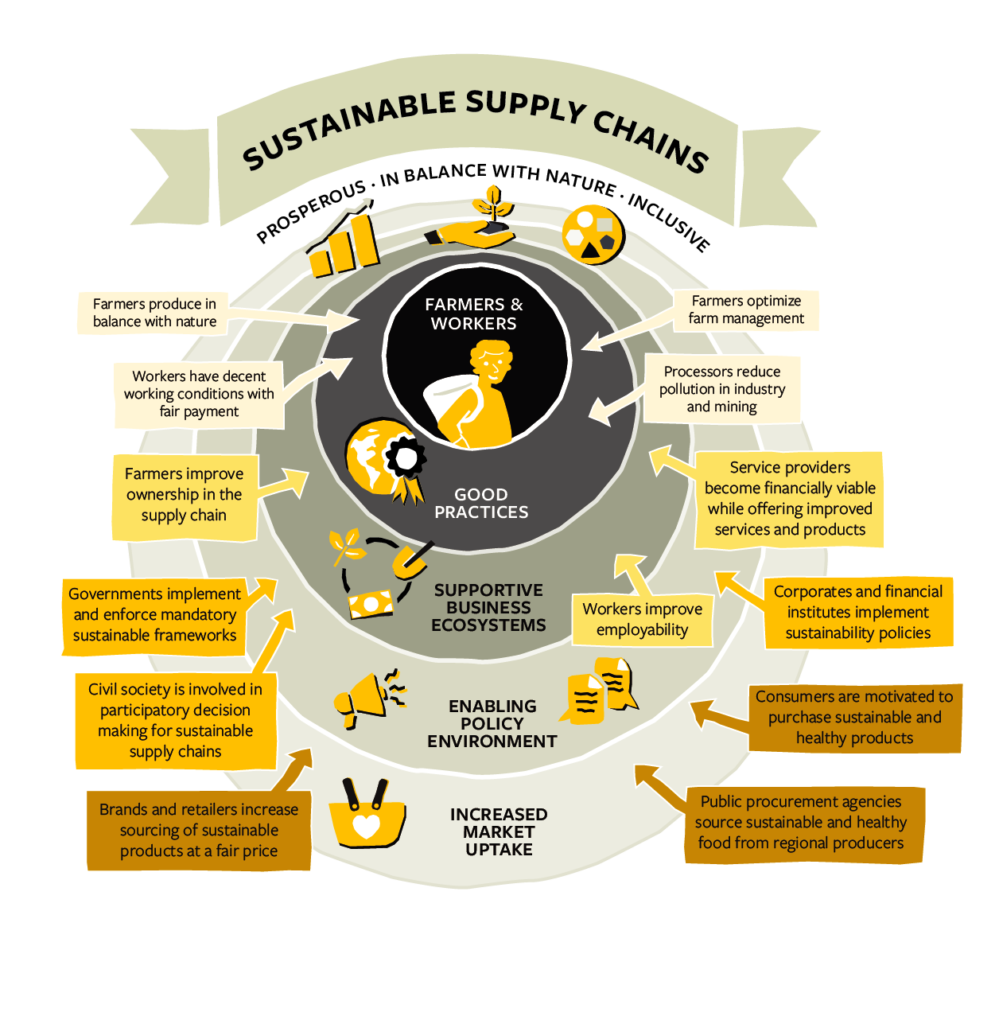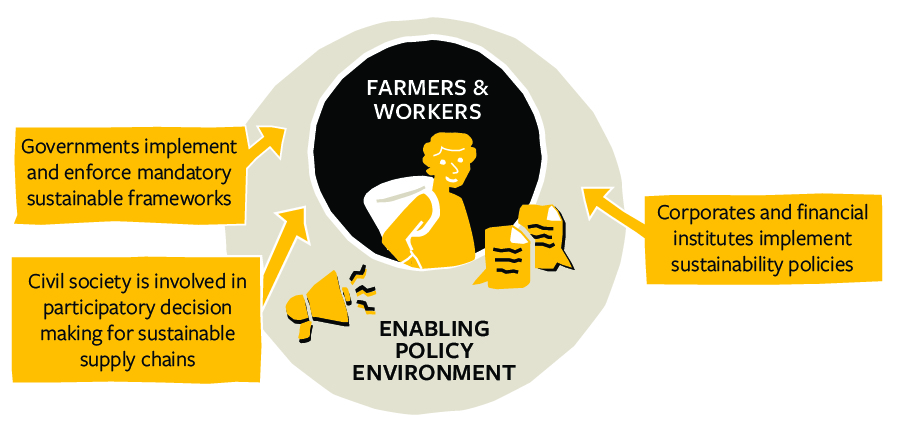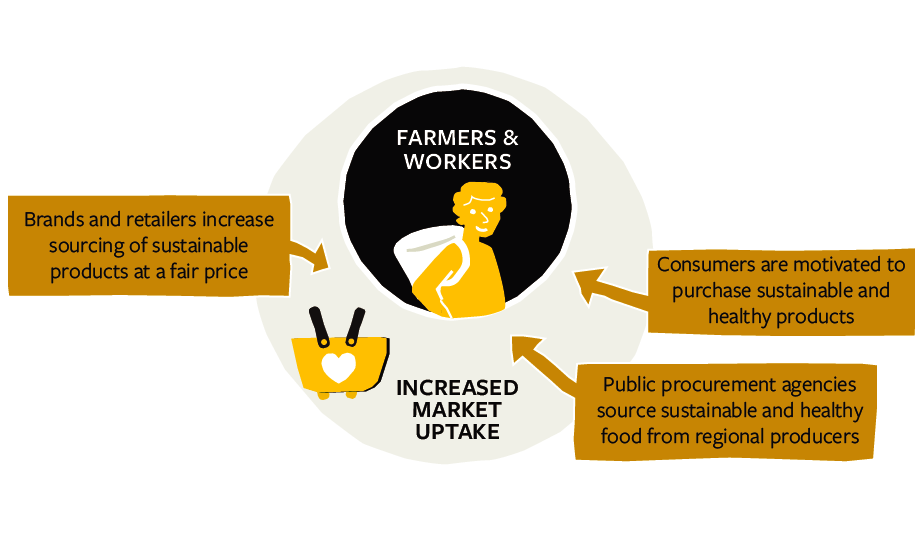
Reclaiming sustainability is the start of an exciting journey. We want to bring sustainability back to the hundreds of millions of farmers, small scale miners and workers, who still face poverty, are dealing with growing inequality, and are struggling to absorb the blows of climate change.
We want to bring sustainability back home.
jeroen douglas
Strategic focus

Glocality
We need a new economy. An economy that works for all, with a better balance between local economic development and globalization. This better balance — which we refer to as glocality — will require increased and renewed ownership of sustainability by farmers and workers.
Reclaim Sustainability
As sustainability goes mainstream, more and more companies are keen to show off their credentials by adopting different types of certification, labels and ethical commitments. Analysing the emerging initiatives, we see an erosion of credibility. That’s why we need to reclaim the concept. Sustainability is about prosperity, inclusivity and production in balance with nature. Triple bottom line, and for Solidaridad: farmers first.

After 50 years of partnerships with every single actor in supply chains as diverse as textiles, soy, livestock, gold, sugar, and palm oil, we have learned a lot. We’ve learned that voluntary standards aren’t enough. Remember the fairtrade mark? It was a great start, but it didn’t create enough change.
The majority of smallholder farmers, workers, and miners are still below the living income line. So while fair trade was a success, and we still work to increase consumer demand for sustainably produced products, more is needed to achieve real change. In our 2016-2020 strategy, we already moved beyond certification by working on the development of national sustainability standards and by offering digital farming solutions based on self-assessments, peer reviews, and continual improvements. In the coming years, we want to take it further.
It’s time for a more fundamental approach to sustainability. We need to give farmers and workers ownership of sustainability again. We will urge companies and governments to walk the talk: it is not enough to express commitment toward sustainability. Things really need to change at the farmers and workers level! We will increase our commitment to monitor worldwide progress of sustainability, for example by publishing periodical reports on the state of smallholder farming in the world. Only sustainability that really changes realities for farmers and workers in a positive way can be considered genuine sustainability.
The outdated idea of having only one success measure; profit, needs to end. We want to partner with CEOs and investors so they can lead this change, and move from false product claims to genuine sustainability policies, and from elite controlled supply chains to inclusive ownership models.
So, the problem we are facing together is pretty simple really – we need to redistribute wealth.
More of the price we pay for our food and products should go to the farmers and workers who made it, and our supply chains and infrastructure should be enabling and supporting them to farm and produce in sustainable ways.

Sustainability Principles
When even sustainability initiatives designed to improve livelihoods are failing smallholder farmers and workers, we have to conclude that sustainability has lost its true meaning. There is no such thing as sustainability when the people who produce those goods live in poverty and when natural resources are not managed sustainably. We want to bring sustainability back to its owners: the producers. Sustainability needs to work through in their daily realities. It needs to translate into respect for people, planet and a fair share for everyone in the chain.
Therefore, we validate all our interventions against three core principles:
Implementation
The implementation of our programmes to achieve genuine sustainability take place in in four intervention levels, measured through 14 Key Performance Indicators
- The producer level: Good practices
- The business level: Business ecosystems
- The policy level: Enabling policy environment
- The market level: Market uptake
The four levels are integrally interconnected. Their overall goal is to build resilient communities through sustainable supply chains, in prosperity, balance with nature and inclusivity. Our main strategic pathways for change are cutting through all four levels in order to create an economy that works for all.
Four intervention areas
Good Practices
Good practices refers not only to agriculture practices but include, for example, financial literacy, paying fair wages, protection of workers, good management practices and legal compliance. But also the use of digital solutions to enhance intelligence as a prerequisite for market and finance access. Everything we do on the farm or industry site falls under the area of good practices. Through our comprehensive programme of good practices farmers will improve their social, environmental, and economic performance.

Supportive Business Ecosystems
Farmers and workers depend on their surrounding business ecosystem partners, such as service suppliers, input providers and off takers. Farmers can only make a transition towards more professional and profitable business if they can count on a strong and supportive business ecosystem.

Enabling Policy Environment
Supportive policies can come in many forms. They include both formal and informal, voluntary and mandatory codes, standards, regulations, policies, norms, and practices. While voluntary improvements are great, more mandatory policies and structures are often needed to bring things to real scale. Supportive policies can help to bring the late majority on board, once the few early innovators have shown the benefits of certain sustainable practices. Ideally, there is a smart mix of mandatory, voluntary, national, and international measures that are needed to foster business respect for human rights.

Increased market uptake
In order for sustainable practices to become truly successful, there needs to be a demand for sustainably produced products. That is why we also work on the demand side of the market. Historically, we have worked with private companies in international supply chains and consumers in Europe, and the US. In the next 5 years, we expand our scope to local consumers in the global south, especially in the (mega)cities, and to local private companies and governments in their role of public procurers.

Accelerating through innovations
Innovation is the key to success for any organization and vital for growth, but for Solidaridad it is also the only way to solve some of the imminent and persisting problems we are facing. Innovation is not a goal in itself. It can only be truly successful if it is profitable for its users, easily replicable, not too costly, and improving the efficiency or impact of what we are already doing. It’s also crucial that it creates traction with supply chain partners, citizens, and the donor community.
We focus our efforts in the areas where we feel that our current solutions have not reached sufficient speed at scale, more specifically: global sector transformation, creating decent work, and leveraging the potential of local urban markets. It is in these areas, that we need innovation that accelerates change most.


Organization
The network is supported by a secretariat which is providing global guidance and support on strategy standards, guidelines and policies, and innovation. Our organizational structure, principles and values, HR, Communication and Project Monitoring and Evaluation are also all optimally geared towards the effective implementation of this strategy.
